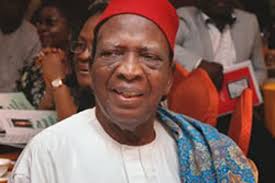Southern Leaders Insist On New Constitution
The Southern Leaders of Thought have insisted that Nigeria requires a new constitution to be adopted by the people in a referendum.
A statement yesterday by the Chairman of the group, Prof. Ben Nwabueze, said restructuring would not meaningfully be done by amendment to the existing 1999 Constitution, and therefore proposed a new constitution to be adopted by the people through a referendum.
The leaders posited that it was disquieting that the National Assembly was still regaling Nigerians with talks about constitution amendment, and making itself part of the problem standing in the way of re-structuring.
The leaders explained that the 1999 Constitution must be replaced, because it was never a democratic constitution in the first instance.
Their words: “Indeed, it is a constitution only in a loose sense of the word, but not in the strict, generally accepted sense of ‘an original act of the people’ by which a state and its government are constituted. The 1999 Constitution was not made by the people either through a referendum or through a constituent assembly specially elected for the purpose and specifically mandated in that behalf or both but was made instead by the Federal Military Government (FMG) by way of a schedule to a Decree, Decree 24 of 1999.”
To them, the fact that the constitution was not made by the people constitutes a flaw that cannot be cured. “Therefore nothing can change its character as a constitution made, not by the people, but by the military and simply imposed on the people by that government and that it has become largely, if not thoroughly, discredited:
“The 1999 Constitution as it were currently, commands or enjoys little respect and obedience among Nigerians. It has been deprived of much authority by manifold acts of abuse, perversion, desecration and even subversion perpetrated with impunity among others.”
On the role of the new constitution, the Southern Leaders said it would among other things, establish new territorial structures of government in the six or eight zones or regions, each with its own separate zonal or regional constitution; redistribute powers between the Federal Government and the federating units and establish other structures as may be required, such as other apparatuses of government, like regional or state police force and independent electoral body for each zone or region.
They posited that the misconception surrounding the issue of restructuring was the view by the National Assembly that the 1999 Constitution could only be altered or amended (sections 8 and 9) but could not be completely abolished and replaced by a new constitution.
“This view is erroneous, because it fails to take account of the fact that the 1999 Constitution can be abolished simply by the repeal of Decree 24 of 1999 to which it is annexed as a schedule,” they said.
They, however, said the approval of a new constitution at a referendum and the abolition of the 1999 Constitution must be synchronised. In other words, the two must be made to take effect at one and the same time, i.e. contemporaneously or simultaneously, to avoid a vacuum, adding that the National Assembly could not be sidelined completely in the process of making a new constitution “except of course where the process is by means of a revolution. That was the error of the 2014 National Conference which was not established or authorised by law and which, therefore lacked power to take legally binding decisions or to implement or enforce them.”
Other leaders who endorsed the statement include: Chief Emeka Anyaoku; Chief Ayo Adebanjo; Professor Kimse Okoko; General Alani Akinrinade (rtd); Admiral Ndubuisi Kanu (rtd); General Ike Nwachukwu; Chief Donald Duke, Obong Victor Attah, Otunba Gbenga Daniel and Solomon Asemota (SAN).





